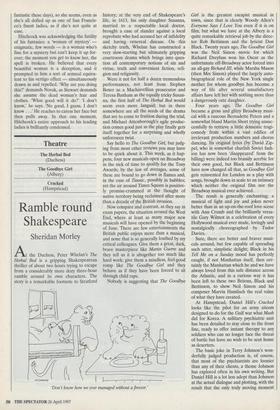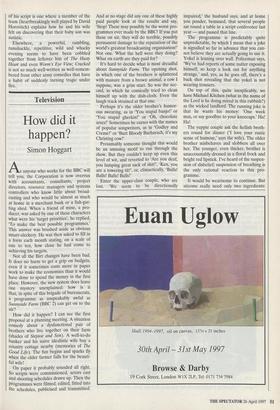Theatre
The Herbal Bed (Duchess) The Goodbye Girl (Albery) Cracked (Hampstead)
Ramble round Shakespeare
Sheridan Morley
Athe Duchess, Peter Whelan's The Herbal Bed is a gripping Shakespearean thriller of about two hours trying to escape from a considerably more dozy three-hour ramble around its own characters. The story is a remarkable footnote to Stratford history; at the very end of Shakespeare's life, in 1613, his only daughter Susanna, married to a respectable local doctor, brought a case of slander against a local reprobate who had accused her of infidelity and having venereal disease. On this sketchy truth, Whelan has constructed a very slow-starting but ultimately gripping courtroom drama which brings into ques- tion all contemporary notions of sin and virtue, truth and convenient fiction, reli- gion and religiosity.
Were it not for half a dozen tremendous performances, not least from Stephen Boxer as a Machiavellian prosecutor and Teresa Banham as the equally tricky Susan- na, the first half of The Herbal Bed would seem even more languid; but in there somewhere are all the seeds of the drama that are to come to fruition during the trial, and Michael Attenborough's agile produc- tion comes good just as the play finally gets itself together for a surprising and wholly unforeseen twist.
Say hello to The Goodbye Girl, but judg- ing from most other reviews you may have to be quick about it. This week, as it hap- pens, four new musicals open on Broadway in the nick of time to qualify for the Tony Awards; by the law of averages, some of these are bound to go down in flames and, in the case of Titanic, possibly in bubbles; yet the air around Times Square is positive- ly promise-crammed at the thought of native territory being reclaimed after more than a decade of the British invasion.
Now compare and contrast, as they say in exam papers, the situation around the West End, where at least as many major new musicals will have opened by the beginning of June. There are few entertainments the British public enjoys more than a musical, and none that is so generally loathed by my critical colleagues. Give them a great, dark, brave masterpiece like Martin Guerre and they tell us it is altogether too much like hard work; give them a mindless, feel-good romp like The Goodbye Girl and they behave as if they have been forced to sit through child rape.
Nobody is suggesting that The Goodbye
'Don't know how we ever managed without a freezer.'
Girl is the greatest escapist musical in town, since that is clearly Woody Allen's Everyone Says I Love You even if it is on film; but what we have at the Albery is a quite remarkable retrieval job by the direc- tor Rob Bettinson and the lyricist Don Black. Twenty years ago, The Goodbye Girl was the Neil Simon movie for which Richard Dreyfuss won his Oscar as the unfortunate off-Broadway actor forced into an all-gay Richard III, while Marsha Mason (then Mrs Simon) played the largely auto- biographical role of the New York single mother for whom goodbye has become a way of life after several unsatisfactory affairs have left her with nothing more than a dangerously cute daughter.
Four years ago, The Goodbye Girl became a gross and glitzy Broadway musi- cal with a raucous Bernadette Peters and a somewhat bland Martin Short trying unsuc- cessfully to retrieve a little domestic tragi- comedy from within a vast edifice of irrelevant production numbers and chorus dancing. Its original lyrics (by David Zip- pel, who in somewhat churlish Soviet fash- ion has now been 'disappeared' from the billing) were indeed too brassily acerbic for their own good, but Black and Bettinson have now changed all that, so Goodbye Girl gets reinvented for London as a play with songs, brought down in scale to an intimacy which neither the original film nor the Broadway musical ever achieved.
The result is generally enchanting; a musical of light and joy and jokes never better than in an up-on-the-roof love scene with Ann Crumb and the brilliantly versa- tile Gary Wilmot in a celebration of every Hollywood musical ever made, lovingly and nostalgically choreographed by Tudor Davies.
Sure, there are better and braver musi- cals around, but few capable of spreading such utter, simplistic delight; Black in his Tell Me on a Sunday mood has perfectly caught, if not Manhattan itself, then cer- tainly the Manhattan which he and we have always loved from this safe distance across the Atlantic, and in a curious way it has been left to these two Britons, Black and Bettinson, to show Neil Simon and his composer Marvin Hamlisch the real value of what they have created.
At Hampstead, Daniel Hill's Cracked looks like the pilot for an army sitcom designed to do for the Gulf war what Mash did for Korea. A military psychiatric unit has been detailed to stay close to the front line, ready to offer instant therapy to any soldiers who can no longer face the threat of battle but have no wish to be sent home as deserters.
The basic joke in Terry Johnson's won- derfully judged production is, of course, that most of the psychiatrists are loonier than any of their clients, a theme Johnson has explored often in his own writing. But Daniel Hill is a lot less adept than Johnson at the actual dialogue and plotting, with the result that the only truly moving moment of his script is one where a member of the team (heartbreakingly well played by David Horovitch) explains how he and his wife felt on discovering that their baby son was autistic.
Elsewhere, a powerful, rambling, ramshackle, repetitive, wild and whacky evening seems to have been cobbled together from leftover bits of The Hasty Heart and even Worm's Eye View; Cracked is not so much well-written as well-remem- bered from other army comedies that have a habit of suddenly turning tragic under fire.



































































 Previous page
Previous page